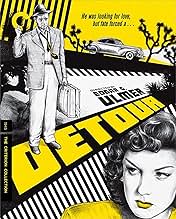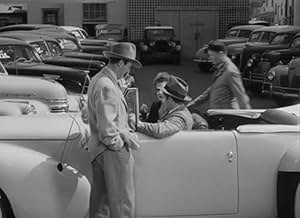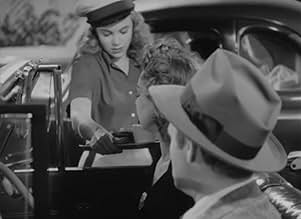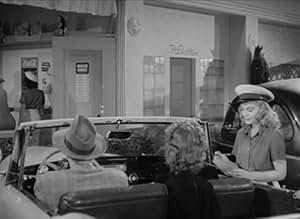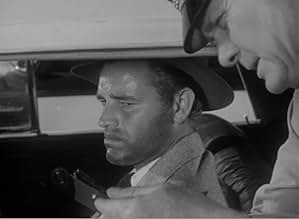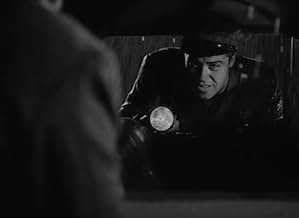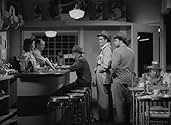IMDb-BEWERTUNG
7,3/10
20.966
IHRE BEWERTUNG
Zufällige Ereignisse verwickeln den Anhalter Al Roberts in ein immer enger werdendes Netz von Film-noir-Problemen.Zufällige Ereignisse verwickeln den Anhalter Al Roberts in ein immer enger werdendes Netz von Film-noir-Problemen.Zufällige Ereignisse verwickeln den Anhalter Al Roberts in ein immer enger werdendes Netz von Film-noir-Problemen.
- Auszeichnungen
- 1 wins total
Don Brodie
- Used Car Salesman
- (Nicht genannt)
Roger Clark
- Cop
- (Nicht genannt)
Eddie Hall
- Tony - Used-Car Lot Mechanic Inspecting Car
- (Nicht genannt)
Harry Mayo
- Nightclub Patron
- (Nicht genannt)
Harry Strang
- California Border Patrolman
- (Nicht genannt)
Empfohlene Bewertungen
8dxia
One recurrent thought passes through my mind as I watch "Detour." It is that I do not believe a single moment of its story-telling. It isn't because of the incredible coincidences or the bitter irony but because of the simple goodness of the main character. Characters in film noir are not role models or good people placed into bad circumstances. They are bad people who believe that they're good.
The characters in "Double Indemnity," "Body Heat," or "The Talented Mr. Ripley" do not think of themselves as bad people. They believe they are forced into their crimes by the world, which is the essential difference between crime movies and noir. As pointed out by Roger Ebert: "the bad guys in crime movies know they're bad and want to be, while a noir hero thinks he's a good guy who has been ambushed by life."
"Detour" is told through the central character, Al Roberts, who recalls his story as one made through impossible coincidences and horrible luck. But there is something not right about his story. The audience can pick out the incongruities and flaws as soon as they're told. Was Charles Haskell's death really the result of bad luck or simply a murderer trying to convince himself that it was? We wonder if it is possible that a person as innocent as Al says he is can be forced into such immoral activities. However, the explanation is quite clear. Al is retelling the story not as a true confession but as a man reviewing his defense to the police.
Watching the movie, I was reminded of Tanazaki's "The Key," a novel in which the main character deliberately lies to the audience as a way of reaching the story's conclusion. We do not see a real conclusion to "Detour," but we sense that the police will find the same flaws in Al's story as we do. And that is not a fatal form of story-telling but a way of looking into the mind of a true noir character and seeing the darker depths of his soul. That is why film noir is so haunting and why this movie is so definitive in its genre.
The characters in "Double Indemnity," "Body Heat," or "The Talented Mr. Ripley" do not think of themselves as bad people. They believe they are forced into their crimes by the world, which is the essential difference between crime movies and noir. As pointed out by Roger Ebert: "the bad guys in crime movies know they're bad and want to be, while a noir hero thinks he's a good guy who has been ambushed by life."
"Detour" is told through the central character, Al Roberts, who recalls his story as one made through impossible coincidences and horrible luck. But there is something not right about his story. The audience can pick out the incongruities and flaws as soon as they're told. Was Charles Haskell's death really the result of bad luck or simply a murderer trying to convince himself that it was? We wonder if it is possible that a person as innocent as Al says he is can be forced into such immoral activities. However, the explanation is quite clear. Al is retelling the story not as a true confession but as a man reviewing his defense to the police.
Watching the movie, I was reminded of Tanazaki's "The Key," a novel in which the main character deliberately lies to the audience as a way of reaching the story's conclusion. We do not see a real conclusion to "Detour," but we sense that the police will find the same flaws in Al's story as we do. And that is not a fatal form of story-telling but a way of looking into the mind of a true noir character and seeing the darker depths of his soul. That is why film noir is so haunting and why this movie is so definitive in its genre.
Is Detour just a bad dream? Or a masochistic reverie dredged up out of the sumps of self-loathing? Long before setting out on the road trip that took such a disastrous turn, Tom Neal was a picky eater at life's banquet. Pounding the ivories in a Manhattan nitery, he sulks that his talent goes unappreciated (when a drunk tips him a ten-spot, it's 'a piece of paper crawling with germs'). He sabotages his rapturous renditions of Chopin and Brahms waltzes with a left-handed boogie-woogie beat. When his girl, the club's shantoozie, tells him that he'll make it to Carnegie Hall 'someday,' he snaps back, 'Sure, as a janitor. Maybe I'll make my debut in the basement,' and 'Yeah, someday if I don't get arthritis first.' Neal's lousy with what we now call issues.
When his fiancée heads to Los Angeles to try for the lush life, he lets her go, then, suddenly lonesome, decides to hitch out to the coast. In Arizona, he thumbs a ride from a pill-popping driver (Edmund McDonald) with scratches on his wrist from tussling with a 'wild animal' a woman he had picked up in Louisiana. When Neal takes over the wheel during a rainstorm, McDonald up and dies and conks his head on a rock as he slumps out the passenger door. Looks bad. Since he casts himself as eternal victim, Neal, though blameless, guiltily drags the body into the desert and assumes its identity (along with car and wallet). Later, at a gas station, he offers a lift to another thumb-jockey (Ann Savage), even though she looks like she 'just got thrown off the crummiest freight train in the world.' (Does the phrase 'self-destructive' strike a familiar note?) In fact, she's none other than the beast who sank her claws into the deceased and plans to make an even bigger feast out of Neal....
The stubble on Neal's unshaved chin can't disguise his pouty, pretty-boy looks, and he proves just right as this callow, ill-starred loser (a better actor would have added superfluous dimensions). If he and his self-absorbed predicament start to wear a little thin, it ceases to matter when Savage arrives halfway through to give a performance that beggars all description. Owing either to Ulmer's or her own genius (or to exigent production values), her hard face stays stripped of glamor when she does slap on the war paint, the effect is primitive, alarming, with eyebrows that looked slashed on with a stiletto under an unkempt riot of hair. She starts off slowly, until, supposedly dozing in the shotgun seat, her eyes fly open to size up and devour Neal. It's the most terrifying instant in Detour. From then on in, she's all shrew all the time, drunk or sober, intimidating or seductively manipulative. Thus Savage's Vera entered film history as the hardest-boiled of its femmes fatales. And Neal never knew what hit him.
Insolently original a classic in a class by itself Detour is by no stretch of the imagination a conventional masterpiece (if masterpieces can be counted as conventional). It shows evidence of starting out to be something a longer, more fully developed movie quite different from what it ended up . Groundwork gets laid for developments that never come to pass. What seems to be intended as the plot's centerpiece a scheme to pass Neal off as McDonald, the lost scion of a wealthy family comes to nothing. As does Savage's ominous cough, a clue to her subsequent indifference ('I'm on my way anyhow') to that 'perfume Arizona hands out free to murderers.'
Somewhere along the way, Detour ran out of time, or money, or film stock, and was cobbled together out of footage already in the can, with the aid of peculiar voice-overs (in the last-ditch manner of The Magnificent Ambersons or My Son John). Against all odds, it still worked, and remains one of the best known and most unforgettable titles in the film noir canon, a stunningly effective piece of work that manages to encapsulate, in 67 minutes, all the inchoate angst that informs the cycle. It may have been an accident, but it's the kind of accident you can't peel your eyes off of.
When the noir cycle began to coalesce in the early 1940s, it looked like it was going to take the high road of starry, big-budget prestige productions (The Maltese Falcon, I Wake Up Screaming, The Glass Key, Laura, Double Indemnity, Mildred Pierce). Edgar G. Ulmer's Detour took the low road. A Poverty-Row production empty of box-office names, it was shot on a few cheap sets in a matter of days. But it sweated off a raw power that other alert film-makers working on the fringes of the industry were quick to emulate; the next few years would see Fall Guy, The Guilty, Suspense, Violence, I Wouldn't Be In Your Shoes, Decoy (the pick, along with Detour, of this particular litter) all done with wannabes or has-beens in cast and crew, visually often ugly (the murky lighting more a matter of necessity than moody esthetic choice). It was often inspired movie-making on the most frayed of shoestring budgets.
And yet, with a few exceptions, this second-feature slot was the niche into which film noir would settle until it ran its course in the late 1950s. Which raises a question: Without Detour paving the way for quick-and-dirty, sensational fodder to fill up double bills B-movies that the suits in the front offices didn't much care about and so paid little attention to would the noir cycle have been but a brief flash in the pan? Would it have stayed the passion only of a handful of French cineastes? Would it have amounted to a cycle at all? The debt owed to Detour may be greater than acknowledged.
When his fiancée heads to Los Angeles to try for the lush life, he lets her go, then, suddenly lonesome, decides to hitch out to the coast. In Arizona, he thumbs a ride from a pill-popping driver (Edmund McDonald) with scratches on his wrist from tussling with a 'wild animal' a woman he had picked up in Louisiana. When Neal takes over the wheel during a rainstorm, McDonald up and dies and conks his head on a rock as he slumps out the passenger door. Looks bad. Since he casts himself as eternal victim, Neal, though blameless, guiltily drags the body into the desert and assumes its identity (along with car and wallet). Later, at a gas station, he offers a lift to another thumb-jockey (Ann Savage), even though she looks like she 'just got thrown off the crummiest freight train in the world.' (Does the phrase 'self-destructive' strike a familiar note?) In fact, she's none other than the beast who sank her claws into the deceased and plans to make an even bigger feast out of Neal....
The stubble on Neal's unshaved chin can't disguise his pouty, pretty-boy looks, and he proves just right as this callow, ill-starred loser (a better actor would have added superfluous dimensions). If he and his self-absorbed predicament start to wear a little thin, it ceases to matter when Savage arrives halfway through to give a performance that beggars all description. Owing either to Ulmer's or her own genius (or to exigent production values), her hard face stays stripped of glamor when she does slap on the war paint, the effect is primitive, alarming, with eyebrows that looked slashed on with a stiletto under an unkempt riot of hair. She starts off slowly, until, supposedly dozing in the shotgun seat, her eyes fly open to size up and devour Neal. It's the most terrifying instant in Detour. From then on in, she's all shrew all the time, drunk or sober, intimidating or seductively manipulative. Thus Savage's Vera entered film history as the hardest-boiled of its femmes fatales. And Neal never knew what hit him.
Insolently original a classic in a class by itself Detour is by no stretch of the imagination a conventional masterpiece (if masterpieces can be counted as conventional). It shows evidence of starting out to be something a longer, more fully developed movie quite different from what it ended up . Groundwork gets laid for developments that never come to pass. What seems to be intended as the plot's centerpiece a scheme to pass Neal off as McDonald, the lost scion of a wealthy family comes to nothing. As does Savage's ominous cough, a clue to her subsequent indifference ('I'm on my way anyhow') to that 'perfume Arizona hands out free to murderers.'
Somewhere along the way, Detour ran out of time, or money, or film stock, and was cobbled together out of footage already in the can, with the aid of peculiar voice-overs (in the last-ditch manner of The Magnificent Ambersons or My Son John). Against all odds, it still worked, and remains one of the best known and most unforgettable titles in the film noir canon, a stunningly effective piece of work that manages to encapsulate, in 67 minutes, all the inchoate angst that informs the cycle. It may have been an accident, but it's the kind of accident you can't peel your eyes off of.
When the noir cycle began to coalesce in the early 1940s, it looked like it was going to take the high road of starry, big-budget prestige productions (The Maltese Falcon, I Wake Up Screaming, The Glass Key, Laura, Double Indemnity, Mildred Pierce). Edgar G. Ulmer's Detour took the low road. A Poverty-Row production empty of box-office names, it was shot on a few cheap sets in a matter of days. But it sweated off a raw power that other alert film-makers working on the fringes of the industry were quick to emulate; the next few years would see Fall Guy, The Guilty, Suspense, Violence, I Wouldn't Be In Your Shoes, Decoy (the pick, along with Detour, of this particular litter) all done with wannabes or has-beens in cast and crew, visually often ugly (the murky lighting more a matter of necessity than moody esthetic choice). It was often inspired movie-making on the most frayed of shoestring budgets.
And yet, with a few exceptions, this second-feature slot was the niche into which film noir would settle until it ran its course in the late 1950s. Which raises a question: Without Detour paving the way for quick-and-dirty, sensational fodder to fill up double bills B-movies that the suits in the front offices didn't much care about and so paid little attention to would the noir cycle have been but a brief flash in the pan? Would it have stayed the passion only of a handful of French cineastes? Would it have amounted to a cycle at all? The debt owed to Detour may be greater than acknowledged.
I'm not as fond of DETOUR as some of the other reviewers on here, purely because I found it an entirely depressing viewing experience. It's one of the darkest film noirs out there, leaden with a dreadful atmosphere throughout, full of foreboding, darkness, and misery. And I guess those are the reasons why it's so well remembered.
The film is directed by THE BLACK CAT director Edgar G. Ulmer in much the same way he would direct one of his horror pictures. Tom Neal makes for a rather unlikeable hero, trying desperate to hitch-hike from one end of the country to the other and coming unstuck when he falls in with a seemingly friendly driver. He takes a chance and thinks he's made it when in fact he's just about to meet Ann Savage's Vera.
Savage is the stand-out feature of this film and I hated every element of her angry, vengeful, selfish character. She's the worst femme fatale I've ever seen, a noxious character utterly devoid of redeeming features, to the degree that I found the movie hard to watch whenever she was around (which is most of the time). I admit that I thought the climax was excellent given what's come previously, although the only thing I came away from this feeling was relief, relief that it was over.
The film is directed by THE BLACK CAT director Edgar G. Ulmer in much the same way he would direct one of his horror pictures. Tom Neal makes for a rather unlikeable hero, trying desperate to hitch-hike from one end of the country to the other and coming unstuck when he falls in with a seemingly friendly driver. He takes a chance and thinks he's made it when in fact he's just about to meet Ann Savage's Vera.
Savage is the stand-out feature of this film and I hated every element of her angry, vengeful, selfish character. She's the worst femme fatale I've ever seen, a noxious character utterly devoid of redeeming features, to the degree that I found the movie hard to watch whenever she was around (which is most of the time). I admit that I thought the climax was excellent given what's come previously, although the only thing I came away from this feeling was relief, relief that it was over.
"Detour" is a standout noir, made in 1945 for pennies, and starring Tom Neal, whose art was later imitated in his life when he was charged with murder.
Neal is effective as a man who seems on the surface to be a victim of bad luck and poor judgment. Real bad luck and real poor judgment.
Trying to get from New York to LA by hitchhiking so that he can be with his girlfriend, Al, a talented pianist, is picked up by a guy named Haskell, who, at some point during the ride, dies of we don't know what - probably heart failure. The guy kept taking pills of some sort - my guess is it's digitalis because if it were speed, he wouldn't have fallen asleep.
At any rate, his death leaves Al with a dead body and a car. Feeling no one will believe his story, he hides the body, changes clothes with the victim, takes Haskell's driver's license and money, and leaves. First mistake.
Surely an autopsy would have confirmed the man died of heart failure, number one; and number two, Al in his narration makes reference to the body falling out of the car when he opened the door, indicating that there would then be a bump on the head and he'd then be accused of hitting him.
Uh, Al, I doubt it - the ground was wet and the guy was DEAD. But instead of driving to the nearest police station and explaining what happened, Al takes off.
Later on, he picks up a hitchhiker named Vera. It turns out that she knows he isn't Haskell and uses her knowledge to get him to do what she wants to get more money. If it was downhill in the beginning, now the situation becomes a sheer drop.
There is speculation by viewers that Al is a big fat liar and that his narration, which makes him look like a victim of chance, is skewed, that the facts don't fit his story and that his girlfriend Sue didn't exist.
That is a very interesting way to look at this film, and that conjecture may be true. On the other hand, Al may just be a loser and the victim of bizarre circumstances.
The whole film, and I saw a very grainy print of it, has a bizarre atmosphere. In the New York section, as Sue and Al walk through the streets, there's a fog machine going nuts, giving rise to the conjecture that Sue and Al's romance with her are just in his imagination.
The character of Vera is frightening and pathological; one minute she wants to be treated like a woman by being complimented, and she comes on to Al, and the next, she's threatening him and acting like a shrew. More inconsistencies.
The hard-looking Ann Savage is savage indeed in the role, which is by necessity a quite exaggerated portrayal. Handsome Tom Neal does a good job as Al, and his role includes a substantial narration throughout.
Is this narration what really happened, or is it what he is planning to tell the police if caught? We don't know. The ending was tacked on at the last minute and frankly doesn't feel right.
I like the idea of the ambiguity of the original ending, which matches the ambiguity of the story. The viewer does see this ending, but then it is followed up by another minute of film apparently demanded by the censors.
With Neal's subsequent real-life violent actions and his ultimately being accused of murdering his wife, this film takes on some really macabre aspects.
"Detour" will always remain perhaps the most unusual noir ever produced: made for no money, the strange circumstances of the story, a character who may or may not be lying to the audience, and a leading man who perhaps took his role too seriously. A striking film.
Neal is effective as a man who seems on the surface to be a victim of bad luck and poor judgment. Real bad luck and real poor judgment.
Trying to get from New York to LA by hitchhiking so that he can be with his girlfriend, Al, a talented pianist, is picked up by a guy named Haskell, who, at some point during the ride, dies of we don't know what - probably heart failure. The guy kept taking pills of some sort - my guess is it's digitalis because if it were speed, he wouldn't have fallen asleep.
At any rate, his death leaves Al with a dead body and a car. Feeling no one will believe his story, he hides the body, changes clothes with the victim, takes Haskell's driver's license and money, and leaves. First mistake.
Surely an autopsy would have confirmed the man died of heart failure, number one; and number two, Al in his narration makes reference to the body falling out of the car when he opened the door, indicating that there would then be a bump on the head and he'd then be accused of hitting him.
Uh, Al, I doubt it - the ground was wet and the guy was DEAD. But instead of driving to the nearest police station and explaining what happened, Al takes off.
Later on, he picks up a hitchhiker named Vera. It turns out that she knows he isn't Haskell and uses her knowledge to get him to do what she wants to get more money. If it was downhill in the beginning, now the situation becomes a sheer drop.
There is speculation by viewers that Al is a big fat liar and that his narration, which makes him look like a victim of chance, is skewed, that the facts don't fit his story and that his girlfriend Sue didn't exist.
That is a very interesting way to look at this film, and that conjecture may be true. On the other hand, Al may just be a loser and the victim of bizarre circumstances.
The whole film, and I saw a very grainy print of it, has a bizarre atmosphere. In the New York section, as Sue and Al walk through the streets, there's a fog machine going nuts, giving rise to the conjecture that Sue and Al's romance with her are just in his imagination.
The character of Vera is frightening and pathological; one minute she wants to be treated like a woman by being complimented, and she comes on to Al, and the next, she's threatening him and acting like a shrew. More inconsistencies.
The hard-looking Ann Savage is savage indeed in the role, which is by necessity a quite exaggerated portrayal. Handsome Tom Neal does a good job as Al, and his role includes a substantial narration throughout.
Is this narration what really happened, or is it what he is planning to tell the police if caught? We don't know. The ending was tacked on at the last minute and frankly doesn't feel right.
I like the idea of the ambiguity of the original ending, which matches the ambiguity of the story. The viewer does see this ending, but then it is followed up by another minute of film apparently demanded by the censors.
With Neal's subsequent real-life violent actions and his ultimately being accused of murdering his wife, this film takes on some really macabre aspects.
"Detour" will always remain perhaps the most unusual noir ever produced: made for no money, the strange circumstances of the story, a character who may or may not be lying to the audience, and a leading man who perhaps took his role too seriously. A striking film.
When the pianist Al Roberts gets tired of being miserable and missing his girlfriend who traveled across the country to seek her fortune in Hollywood, he decides to leave New York behind. He has no money to pay for the trip from one coast to the other, so he decides to hitchhike, something that proves to be his downfall. A man who picked him up dies during the journey and Al panics when he pessimistically expects to be accused of the death. He steals not only the man's car, but also his identity and stows away the corpse in a ditch. He then decides to pick up a hitchhiker named Vera, but he will soon regret it because she seems to know his dark secret and will not hesitate to take advantage of it.
The story feels more than a little strained on more than one occasion. It's hard not to fall in love the hopelessness that constitutes Detour. A low-budget thriller directed by Edgar G. Ulmer. Sure, it's an extremely simple B-movie, but it is packed full of interesting quotes, friendly cynicism, pitch black darkness and at least as much rain. It is insanely entertaining to see Vera and Al throw sharp barbs at each other while the tones are so miserable that they find it hard to laugh at them.
With a playing time of over 70 minutes says Detour goodbye long before it has time to start to feel tiring.
The story feels more than a little strained on more than one occasion. It's hard not to fall in love the hopelessness that constitutes Detour. A low-budget thriller directed by Edgar G. Ulmer. Sure, it's an extremely simple B-movie, but it is packed full of interesting quotes, friendly cynicism, pitch black darkness and at least as much rain. It is insanely entertaining to see Vera and Al throw sharp barbs at each other while the tones are so miserable that they find it hard to laugh at them.
With a playing time of over 70 minutes says Detour goodbye long before it has time to start to feel tiring.
Wusstest du schon
- WissenswertesWhile the crew was setting up to film a hitchhiking scene, a passing car tried to pick up Ann Savage (made up to look dirty and disheveled), causing the crew to break out laughing.
- PatzerIn the first shots of Al hitchhiking, the film is reversed. The cars are driving on the wrong side of the highway and the drivers sitting behind the wheel are sitting on the right side of their vehicles.
- Zitate
Al Roberts: Money. You know what that is, the stuff you never have enough of. Little green things with George Washington's picture that men slave for, commit crimes for, die for. It's the stuff that has caused more trouble in the world than anything else we ever invented, simply because there's too little of it.
- VerbindungenEdited into Michael Jackson's This Is It (2009)
- SoundtracksI Can't Believe That You're in Love with Me
(uncredited)
Written by Jimmy McHugh and Clarence Gaskill
Performed by Claudia Drake
Played often in the score
Top-Auswahl
Melde dich zum Bewerten an und greife auf die Watchlist für personalisierte Empfehlungen zu.
Details
- Erscheinungsdatum
- Herkunftsland
- Offizielle Standorte
- Sprache
- Auch bekannt als
- Detour
- Drehorte
- Virginia Street, Reno, Nevada, USA(In rear projection shot in opening scene, the Reno Arch is seen through the car's rear window.)
- Produktionsfirma
- Weitere beteiligte Unternehmen bei IMDbPro anzeigen
Box Office
- Budget
- 30.000 $ (geschätzt)
- Bruttoertrag in den USA und Kanada
- 16.172 $
- Eröffnungswochenende in den USA und in Kanada
- 5.127 $
- 2. Dez. 2018
- Weltweiter Bruttoertrag
- 16.172 $
- Laufzeit1 Stunde 6 Minuten
- Farbe
- Seitenverhältnis
- 1.37 : 1
Zu dieser Seite beitragen
Bearbeitung vorschlagen oder fehlenden Inhalt hinzufügen


![Trailer [OV] ansehen](https://m.media-amazon.com/images/M/MV5BZGEyYTUwNDQtN2ZjZi00YmY2LWE2ZjUtOTY3NjQ3NDQ0Zjg3XkEyXkFqcGdeQXRyYW5zY29kZS13b3JrZmxvdw@@._V1_QL75_UX500_CR0)
